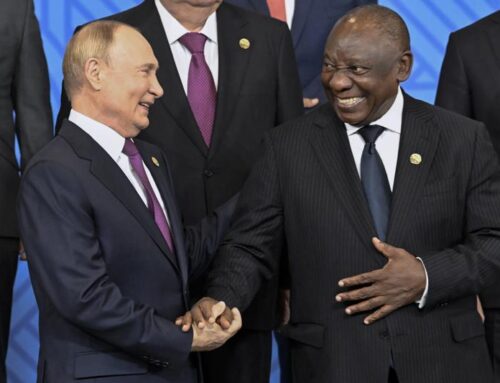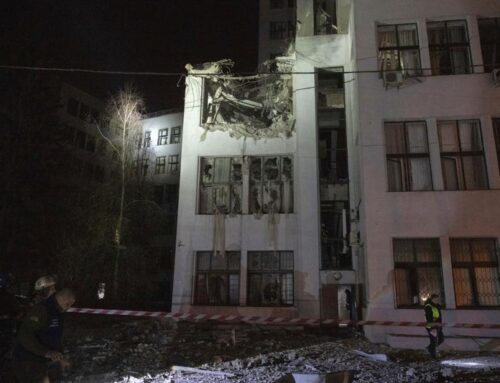KYIV, Ukraine (AP) — In a cramped municipal building in a residential area of the Ukrainian capital, a group of people take turns training to shoot using a replica of a machine gun with the help of a weapons training simulator relying on virtual reality.
The nearly 20 participants — all of them civilians and most of them women — have never held a weapon before.
With Russia’s war on Ukraine now in its 17th month, the Kyiv City Administration has opened up training for civilians who want to learn survival skills, including how to shoot, provide first aid and recognize land mines. These and other skills could be used in a hostile environment provoked by missile strikes and other man-made disasters.
In a dark room with tightly closed blinds, the unreal poof-poof sounds of the replica weapons are heard. People enthusiastically ask the instructors how to hold their weapons properly and ask to try one more time.
“I am more than 45 years old. As soon as the opportunity arose, I decided that I needed to refresh some skills and learn something new,” said Kyiv resident Lada Bondarenko. She was especially impressed by the instructor’s lecture on possible land mine threats.
It was a reminder that the Kyiv region, although not currently on the front lines of the war, is still at major risk because of mines left behind by the Russians who briefly occupied areas on the outskirts of the capital in the early days of the war.
While the fighting on the front lines is now largely in stalemate, indiscriminate Russian missile attacks continue to hit residential areas, wreaking havoc and causing almost daily casualties across the country.
Several days after the registration on the city’s website was opened, more than 2,000 people had signed up for the training, around 70% of them women, said the deputy director for Kyiv’s municipal security, Mykhailo Shcherbyna.
“The main goal is for people to learn how to survive and how to respond to these military threats that exist,” he explained.
According to Shcherbyna, by educating people, local authorities try to prevent more casualties in the future. “The war continues, and we don’t know what the next threats will be.”
In his opinion, one of the reasons why most of those who signed up for the training are women is because a large number of men are already at the front. Also, many women come so that these skills will help them protect not only themselves but their children.
But men, too, attend with the protection of their children in mind.
“I came to be able to explain to my children that there are mines that can tear off arms, legs and take life,” said Vitalii Sumin, aged 38.
His house is located in nearby Irpin, an area in the northwestern outskirts of the capital where fierce battles took place last spring. When the Russians retreated last March, many land mines were left in the area, which now could be deadly dangerous, hidden in the grass.
Vitalii’s wife couldn’t attend the training in person, so he transmitted it online while she stayed at home with their 2-year-old child. Next time, he plans to bring the whole family to the training, especially his 13-year-old, he said.
According to the Ministry of Internal Affairs, around 174,000 square miles (451,000 square kilometers) in Ukraine are potentially contaminated with mines, about the size of the U.S. state of Florida.
On Tuesday, local authorities held the first such training for civilians. Previously, they mostly trained people who worked in municipal services. In the early days of the war, they taught people basic skills so they could start fighting immediately.
According to Shcherbyna, the deputy chief of municipal security, last year they taught about 15,000 people, and approximately 3,000 of them joined the army.
Instructor Yevhen Naumov said that Russia’s invasion showed that the threat from Ukraine’s biggest neighbor would not disappear easily. In his opinion, by attending this training, people were preparing for the possibility that this war could last for a long time.
___
Associated Press writer Illia Novikov contributed to this report.
___
Follow AP’s coverage of the war in Ukraine at https://apnews.com/hub/russia-ukraine
This article first appeared on APnews.com







Leave A Comment